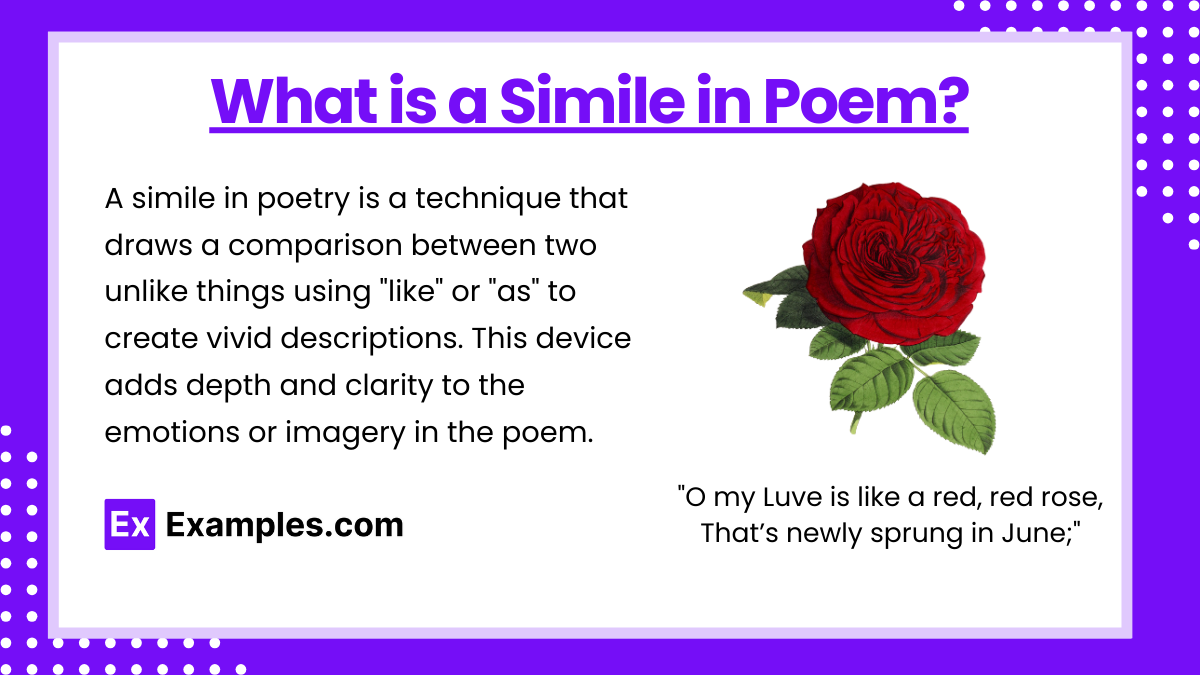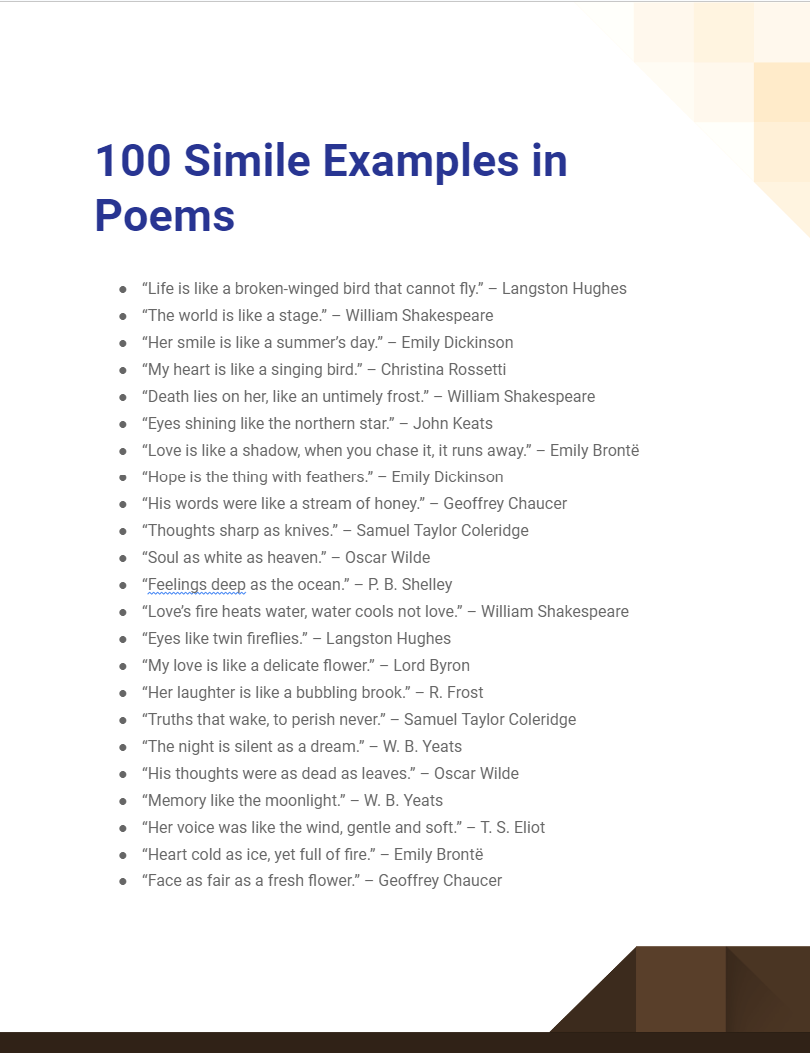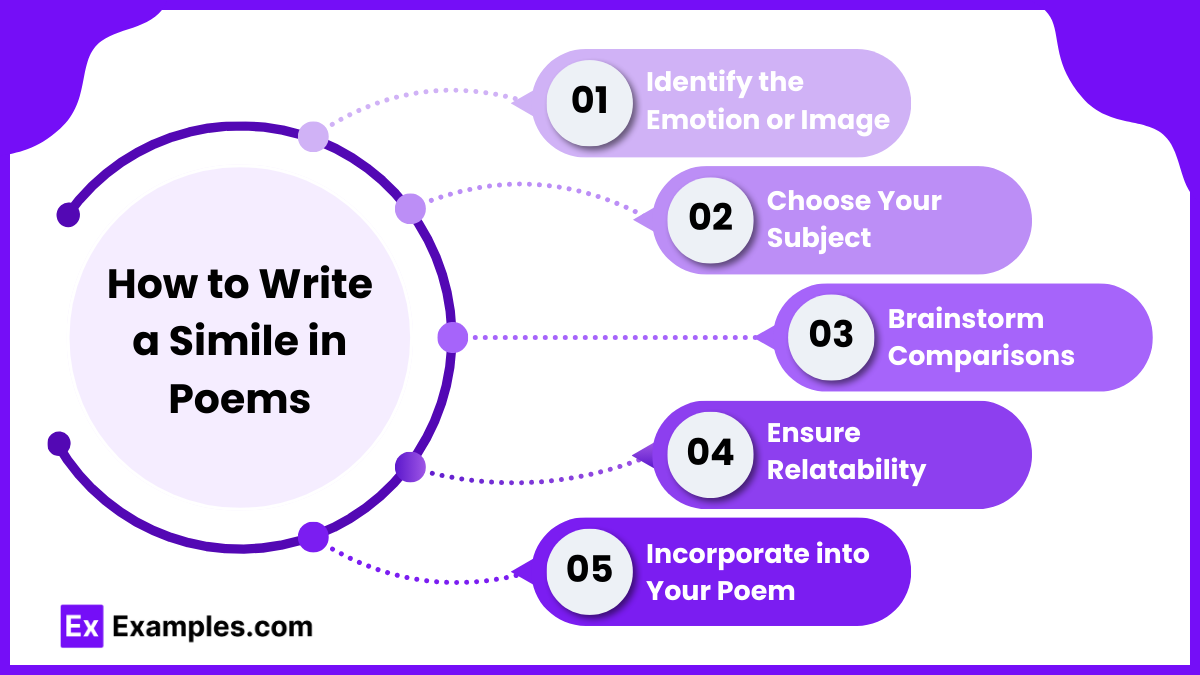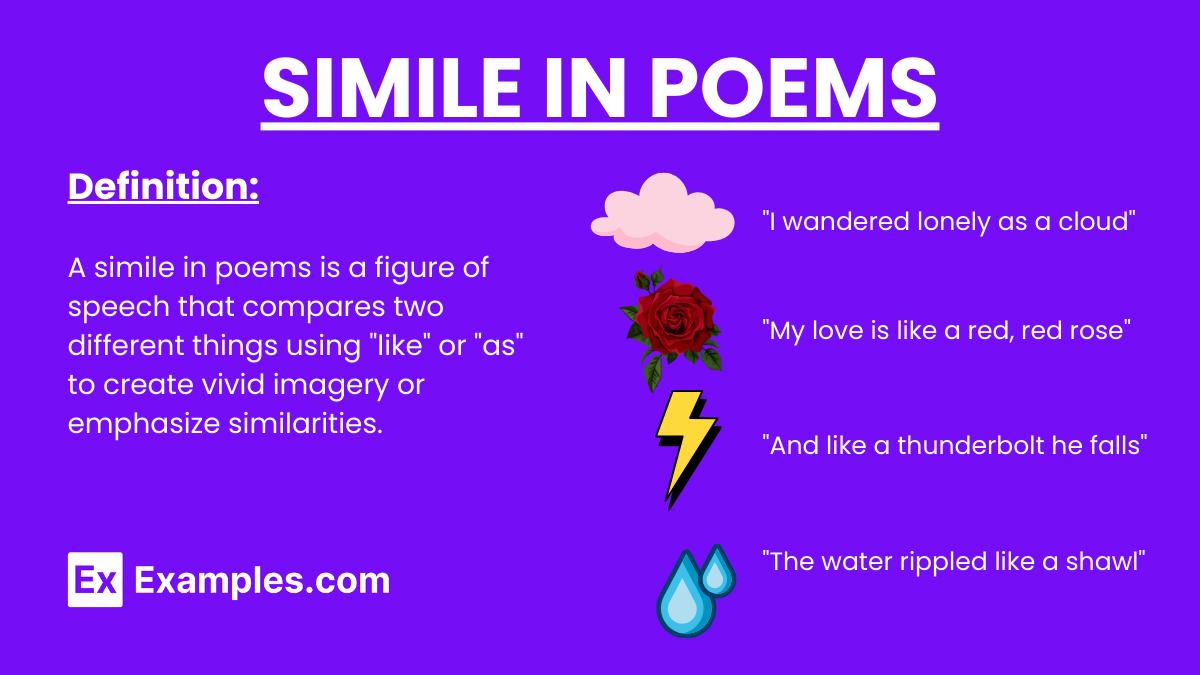99+ Simile in Poems Examples
Similes have always been the shimmering threads in the intricate tapestry of poetry. They bridge the vast chasm between the abstract and tangible, granting readers a lens to view emotions, thoughts, and images in vivid clarity. Whether it’s the classics that have stood the test of time or contemporary verses, similes breathe life into lines and stanzas. Dive in to explore enchanting simile examples in poems, discover how to weave your own, and pick up invaluable tips along the way.
What is a Simile in Poem? – Definition

What Is the Best Example of Simile in Poems?
Choosing the “best” example is subjective as it varies based on personal preferences. However, one of the most iconic similes that has resonated with many across time comes from Robert Burns’ poem “A Red, Red Rose”:
“O my Luve is like a red, red rose That’s newly sprung in June; O my Luve is like the melody That’s sweetly played in tune.”
In this excerpt, Burns compares his love to both a fresh rose and a sweet melody, evoking feelings of freshness, passion, and harmony. This simile is enduring in its simplicity and emotional depth.
100 Simile Examples in Poems

Similes are the poetic bridges that link the tangible to the intangible, evoking vivid imagery and profound emotions. Spanning across eras, styles, and themes, here are 100 poignant similes drawn from the vast ocean of poetry, each bearing the power to resonate, inspire, and transcend.
- “Life is like a broken-winged bird that cannot fly.” – Langston Hughes
- “The world is like a stage.” – William Shakespeare
- “Her smile is like a summer’s day.” – Emily Dickinson
- “My heart is like a singing bird.” – Christina Rossetti
- “Death lies on her, like an untimely frost.” – William Shakespeare
- “Eyes shining like the northern star.” – John Keats
- “Love is like a shadow, when you chase it, it runs away.” – Emily Brontë
- “Hope is the thing with feathers.” – Emily Dickinson
- “His words were like a stream of honey.” – Geoffrey Chaucer
- “Thoughts sharp as knives.” – Samuel Taylor Coleridge
- “Soul as white as heaven.” – Oscar Wilde
- “Feelings deep as the ocean.” – P. B. Shelley
- “Love’s fire heats water, water cools not love.” – William Shakespeare
- “Eyes like twin fireflies.” – Langston Hughes
- “My love is like a delicate flower.” – Lord Byron
- “Her laughter is like a bubbling brook.” – R. Frost
- “Truths that wake, to perish never.” – Samuel Taylor Coleridge
- “The night is silent as a dream.” – W. B. Yeats
- “His thoughts were as dead as leaves.” – Oscar Wilde
- “Memory like the moonlight.” – W. B. Yeats
- “Her voice was like the wind, gentle and soft.” – T. S. Eliot
- “Heart cold as ice, yet full of fire.” – Emily Brontë
- “Face as fair as a fresh flower.” – Geoffrey Chaucer
- “As brave as a lion, his heart beat.” – Robert Louis Stevenson
- “Eyes as mysterious as the dark side of the moon.” – Robert Frost
- “Tears flowing like a river of sorrow.” – Emily Dickinson
- “Emotions swirling like a tempest.” – Edgar Allan Poe
- “Hearts entwined like vines.” – P. B. Shelley
- “Her beauty shines like the morning sun.” – Lord Byron
- “Love is like a rose, beautiful and calm, but willing to draw blood in its defense.” – Mark Overby
- “His voice cracked like a dried twig.” – Maya Angelou
- “Her skin as smooth as polished ivory.” – T. S. Eliot
- “The mind moves like a pendulum.” – R. Frost
- “Her tears flowed like sweet wine.” – Samuel Taylor Coleridge
- “Lips as red as ripening fruit.” – Christina Rossetti
- “Love’s spark burns as bright as a comet.” – W. B. Yeats
- “Thoughts as fleeting as the morning dew.” – Geoffrey Chaucer
- “Heart beats as rhythmic as a song.” – Edgar Allan Poe
- “Memories faded like worn-out cloth.” – Emily Dickinson
- “Her aura shines as bright as a halo.” – Langston Hughes
- “His anger burnt like a raging fire.” – Robert Louis Stevenson
- “Words as light as air.” – William Shakespeare
- “The moon’s glow, soft as a lover’s whisper.” – Emily Brontë
- “Despair hung around him like a cloak.” – Oscar Wilde
- “Dreams flit around her like butterflies.” – P. B. Shelley
- “Sorrow as deep as the sea.” – Lord Byron
- “His touch was as cold as marble.” – T. S. Eliot
- “Her elegance, graceful as a swan.” – Samuel Taylor Coleridge
- “Eyes as piercing as an eagle’s.” – Edgar Allan Poe
- “Love as old and as deep as time.” – Robert Frost
- “His words flowed like a gentle stream.” – John Keats
- “Hope, fluttering like a bird trapped inside.” – Maya Angelou
- “Her innocence was as fresh as morning dew.” – Christina Rossetti
- “Pain sharp as a razor’s edge.” – Sylvia Plath
- “His loyalty, sturdy as an oak.” – W. B. Yeats
- “Her joy, radiant as the sun.” – Robert Burns
- “Love, elusive as a shadow at dusk.” – Emily Brontë
- “Eyes twinkling like stars in a midnight sky.” – T. S. Eliot
- “Her grace, flowing like a river.” – Geoffrey Chaucer
- “Heartbreak as silent as a winter snowfall.” – Samuel Taylor Coleridge
- “His gaze, deep and mysterious as the fathomless sea.” – Edgar Allan Poe
- “Desires burning like an unquenchable flame.” – Lord Byron
- “Words as delicate as a spider’s web.” – Emily Dickinson
- “Soul, free and wild as the wind.” – Langston Hughes
- “Her spirit, as fierce as a tempest.” – P. B. Shelley
- “Trust as solid as bedrock.” – William Shakespeare
- “Eyes, reflecting dreams brighter than a galaxy.” – Robert Louis Stevenson
- “Feelings, swirling like autumn leaves.” – Robert Frost
- “Voice, sweet and lilting as a lullaby.” – John Keats
- “Thoughts, dark and deep as a moonless night.” – Emily Brontë
- “Love, blooming like flowers in spring.” – Christina Rossetti
- “Anger, erupting like a volcano.” – Sylvia Plath
- “Heart, gentle and kind as a dove.” – Maya Angelou
- “Her beauty, radiant as a rainbow after rain.” – T. S. Eliot
- “Dreams, vast and endless as the sky.” – Edgar Allan Poe
- “Faith, unwavering as the mountains.” – Geoffrey Chaucer
- “His courage, roaring like a lion.” – W. B. Yeats
- “Sorrow, deep and consuming as quicksand.” – Oscar Wilde
- “Eyes, bright and hopeful as a new day.” – Robert Burns
- “Love, enduring and strong as time itself.” – Samuel Taylor Coleridge
- “Memories, sweet as honey.” – Emily Dickinson
- “Desire, burning bright and hot as the sun.” – Langston Hughes
- “Words, weighty and profound as the ocean.” – Robert Louis Stevenson
- “Grief, silent and vast as a desert.” – Lord Byron
- “Laughter, infectious and bubbly as a stream.” – P. B. Shelley
- “Voice, resonating like a bell in the distance.” – William Shakespeare
- “Eyes, deep and soulful as a well.” – Emily Brontë
- “Dreams, vivid and colorful as a painter’s palette.” – Christina Rossetti
- “Heart, wild and untamed as a stallion.” – Sylvia Plath
- “His spirit, as boundless as the sky.” – Maya Angelou
- “Trust, golden and pure as sunlight.” – T. S. Eliot
- “Desire, fierce and burning as fire.” – Edgar Allan Poe
- “Love, as timeless and ancient as the stars.” – Geoffrey Chaucer
- “Hope, bright and unwavering as a lighthouse.” – W. B. Yeats
- “Memories, fleeting and ephemeral as mist.” – Oscar Wilde
- “Heart, as tender and fragile as a rose petal.” – Robert Burns
- “Thoughts, vast and uncharted as the universe.” – Samuel Taylor Coleridge
- “Dreams, as distant and unreachable as the horizon.” – Emily Dickinson
- “Eyes, as clear and pure as crystal.” – Langston Hughes
- “Love, deep and unending as the ocean.” – Robert Louis Stevenson
Short Simile Examples in Poems
In poetry, brevity often deepens the impact. Short similes deliver quick and powerful images that resonate in readers’ minds. These similes are concise but packed with meaning, illuminating a scene, emotion, or concept in just a few words.
- Sky as blue as ink.
- Sharp as a pin’s point.
- Bright as a coin’s gleam.
- Quick as a blink.
- Cold as winter’s scream.
- Soft as a dream’s sigh.
- Hot as desert noon.
- Loud as a storm’s cry.
- Fleeting as a balloon.
- Wild as the monsoon.
Famous Simile Examples in Poetry
Renowned poets have a knack for crafting similes that stand the test of time. These similes, drawn from classic poems, have been celebrated for their vivid imagery and emotional depth. They’ve helped shape the world of poetry.
- “Life is like a walking shadow.” – Shakespeare
- “My love is like a red, red rose.” – Robert Burns
- “The world is like a stage.” – Shakespeare
- “Her smile was like a new morning.” – Emily Dickinson
- “Memory is like a frozen lake.” – T.S. Eliot
- “His words were like a silver stream.” – Keats
- “Love’s fire heats water, water cools not love.” – Shakespeare
- “Eyes shining bright as stars.” – Wordsworth
- “Tears like the morning’s dew.” – Shelley
- “Soft as the massacre of suns.” – Emily Dickinson
Simile Examples in Poems for Kids
Kids relish colorful and relatable imagery. These simile examples for kids, tailored for young minds, touch upon the everyday wonders and fantasies they encounter, making poetry a delightful journey of imagination.
- “Happy as a lark in spring.”
- “Shiny as a brand-new ring.”
- “Jumping like popcorn in a pot.”
- “Smooth as a teddy, not a single knot.”
- “Silly as a monkey in a tree.”
- “Busy as a buzzing bumblebee.”
- “Cold as a snowman’s nose.”
- “Twirling like leaves when the autumn wind blows.”
- “Bright as a flashlight in the night.”
- “Floating like a kite in flight.”
Simile Examples in Poems about Love
Love, with its myriad emotions, has always been a prime subject in poetry. These similes convey the depth, intensity, and nature of love in its different forms.
- “Love is like a shadow, always by my side.”
- “Heartbeat fast as a hummingbird’s wings.”
- “Passion burning like an eternal flame.”
- “Love’s touch, gentle as a summer rain.”
- “Eyes that sparkle like stars in love’s night.”
- “Kisses sweet as wine, making everything right.”
- “Love fleeting like a sunset, but memories remain.”
- “Heart heavy as a mountain, love’s bittersweet pain.”
- “Love wild as an untamed river’s flow.”
- “Warm as a hearth’s comforting glow.”
Simile Examples in Poems about Life
Life, in all its complexity, is a vast canvas for poets. These similes touch upon various facets of life, from its challenges to its beauties.
- “Life is fleeting, like a passing cloud.”
- “Challenges hard as a mountain climb.”
- “Moments shining like a gold coin’s gleam.”
- “Life’s mysteries deep as the ocean’s dream.”
- “Pathways winding like a river’s course.”
- “Life, unpredictable as a wild horse.”
- “Journeys long as a horizon’s line.”
- “Days bright as sun, nights like fine wine.”
- “Memories stacked like old books on a shelf.”
- “Life’s rhythm, constant as time itself.”
Simile Examples in Poems about Myself
Self-reflection is a frequent muse for poets. These similes offer introspection, self-awareness, and a journey into one’s psyche and physical being.
- “Soul vast as the universe’s expanse.”
- “Eyes reflective as mirrors of the past.”
- “Heart wild as a bird free in the sky.”
- “Thoughts deep as canyons, where secrets lie.”
- “Dreams numerous as stars in the night.”
- “Hope burning within, like a lantern’s light.”
- “Voice varied as the colors of a prism.”
- “Spirit soaring like a melody’s rhythm.”
- “Steps steady as the ticking of a clock.”
- “Emotions swirling like a tempest’s shock.”
Simile Examples in Poems About Smile
A smile, though a simple act, can convey a universe of emotions. These similes delve into the nuances, warmth, and significance of a smile.
- “Smile bright as the morning sun.”
- “Grin infectious as a tune hummed and done.”
- “Lips curving like a crescent moon’s glow.”
- “Smile, gentle as the first winter’s snow.”
- “Laughter, ringing like a bell’s chime.”
- “Smile hiding secrets, deep and sublime.”
- “Grin wide as a horizon’s stretch.”
- “Smile, a comfort, a soft touch, a sketch.”
- “Eyes twinkling, a smile’s silent song.”
- “Lips upturned, where hopes belong.”
Why is simile used in poems/poetry?
Similes are among the most vibrant tools in a poet’s arsenal, adding depth, color, and clarity to their words.
- Emphasis on Emotion and Imagery: At the heart of poetry is emotion. Similes assist poets in amplifying the emotional impact of their words, drawing readers into their world. By comparing one thing to another, they emphasize characteristics and evoke particular feelings or moods.
- Creating Relatability: Similes can make complex or unfamiliar concepts easier to grasp. By comparing something abstract to something concrete and familiar, poets help readers connect to the poem on a personal level.
- Adds Rhythmic Qualities: The structure of a simile can contribute to the poem’s rhythm, enhancing its musical quality.
- Enhancing Descriptive Power: Descriptions come alive with similes. Instead of merely stating a fact, the poet draws an imaginative picture, allowing the reader to see, feel, hear, taste, or smell the essence of what’s being described.
- Deepening Layers of Meaning: A well-placed simile can add layers of interpretation to a poem. It invites readers to explore further, deciphering the nuanced relationship between the two things being compared.
How to Write a Simile in Poems? – Step by Step Guide

- Identify the Emotion or Image: Start by pinpointing the emotion or image you wish to convey. Is it melancholy, joy, surprise, mystery?
- Choose Your Subject: Decide on the primary subject of your simile. This could be an emotion, an object, a person, or a scene.
- Brainstorm Comparisons: Think of various things your subject can be compared to. If your subject is ‘love,’ consider what images or feelings resonate with that emotion.
- Ensure Relatability: Make sure the comparison makes sense and is something your audience can relate to. A simile should clarify, not complicate.
- Incorporate into Your Poem: Introduce your simile in a way that flows naturally with the rest of your poem. It shouldn’t feel forced or out of place.
- Refine and Test: Share your poem with friends or fellow poets. Feedback can help you determine if your simile has the desired effect.
Tips to Writing a Simile Poem
- Avoid Clichés: Phrases like “as busy as a bee” or “as clear as day” have been overused. Aim for fresh comparisons that surprise and delight your readers.
- Vary Your Similes: Don’t just stick to ‘like’ and ‘as.’ While these are common, exploring other comparative phrases can add diversity to your poem.
- Use Specifics: The more specific your comparison, the more vivid the image. Instead of comparing someone’s eyes to stars, for instance, you could compare them to “stars on a cloudless summer night.”
- Match the Tone: Ensure your simile aligns with the poem’s tone. A whimsical simile might not fit well in a somber poem, and vice versa.
- Practice Regularly: Like any other skill, writing similes improves with practice. The more you write, the more naturally compelling similes will come to you.
- Read Widely: Expose yourself to a range of poets and styles. Not only will this inspire you, but it’ll also help you understand how different poets employ similes to their advantage.
Remember, the beauty of a simile lies in its ability to make readers see the world in a new light. With practice and patience, you can master the art of weaving similes into your poems, adding depth and richness to your poetic tapestry.


